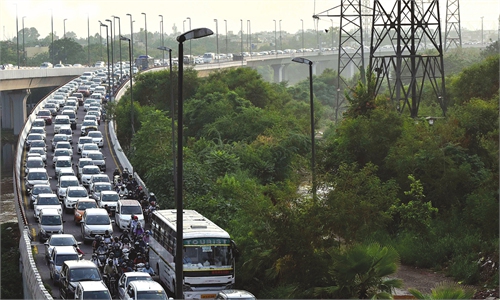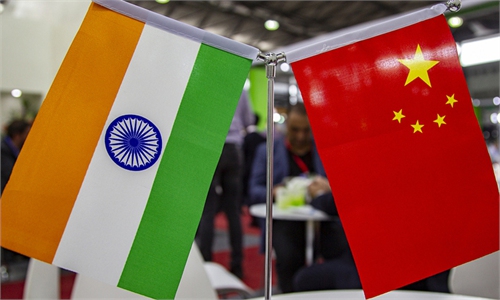Beijing-New Delhi-Moscow trilateral defense ministers’ meeting key for new path

Illustration: Liu Rui/GT
According to Indian media, Russia plans to promote a "China-India-Russia" defense ministers' meeting in September to coordinate deadlocked China-India relations. As early as June, during the delayed celebration of the 75th anniversary of Victory in the Great Patriotic War, Russia stated its intent to help foster meetings between China-India defense ministers who were attending the commemoration.
However, due to the high degree of hostility of India against China at that time, a meeting of defense ministers of the two countries could not be realized. But Russia's intention shows that it is worried about the confrontation between the two most populous countries, and hopes that China-India relations can get back to normal.
Russia's concern about China-India relations has strong connections with "China-India-Russia" trilateral mechanism. After the end of the Cold War, the US pursued unilateralism and global hegemony, trying to shape a unipolar international system dominated by it. Today, Washington continues to compress Moscow's strategic space, absorbing Eastern European countries and the former Soviet Republics into NATO. It also pushes NATO's defense line to the frontier of Russia's border, and even hopes that Russia will continue to split and turn into a country that will not be able to threaten the US and its allies.
After the collapse of the Soviet Union, the US lost the desire to unite with China to counter its biggest rival and began strategic containment of China. India's ambition to become a major power has increased along with the country's economic growth. China, India and Russia all hope to become an important pole in the post-Cold War multipolar world. They oppose the US' unilateral hegemony. Therefore, China-India-Russia trilateral dialogue mechanisms were founded with initiatives put forward by former Russian foreign minister Yevgeny Primakov.
Although "China-India-Russia" is only a loose dialogue mechanism over the past two decades, the three countries share consistent policies regarding most major international and global affairs.
The trilateral mechanism has improved India's international status. For India in pursuit of the status as a world power, participating in this mechanism will allow it to step on the shoulders of the "giants" and be regarded as important as China and Russia.
India is the only country that has established a trilateral dialogue mechanism with China and Russia among the countries other than the permanent members of the UN Security Council. This gives it the opportunity to show its posture and shape its image as a great power to the world.
Meanwhile, Russia does not want to see the deterioration of China-India relations damage the trilateral mechanism. After the border conflict between China and India in June, New Delhi took a series of measures against Beijing. Politically, India has instigated anti-China sentiments from perspective of both the government and broad society. Militarily, New Delhi has deployed more troops on the China-India border. Economically, the Indian government has successively introduced measures aiming at Chinese companies and products.
New Delhi has sent a signal of decoupling and confrontation with Beijing. If India truly decouples from China or has a large-scale war with China, not only will China-India relations fall into long-term hostility, but New Delhi would completely tilt toward Washington. This will terminate the trilateral mechanism and impose great impact on the BRICS and Shanghai Cooperation Organization. Russia is worried about India's swinging too close to the US. Russia and India have neither historical resentment nor geopolitical conflict between them. Russia has been the largest source of weapons for India, from the Soviet era to today. If India turns to the US due to its conflict with China, then Russia will lose a partner to check and balance the US as well as an important market for weapon exports.
However, in fact, although India may approach the US and play the "American card" against China, it is unlikely that India will tilt toward the US with no limits. New Delhi knows that Washington is roping it in for US own interests. Although India is respected due to its diplomatic stances and principles, this reputation will vanish if it totally becomes a US pawn.
At present, India has gone too far on its anti-China road, and is having serious trouble finding its way out. However, Beijing has been refraining from taking countermeasures so far. This shows the rationality of China as a great power, and reserves room for improving China-Indian relations. Russia's proposal of trilateral defense ministers' meeting is an important attempt to create opportunities for betterment of China-India ties.
The author is a senior research fellow of the Academy of Regional and Global Governance at the Beijing Foreign Studies University and president of the Chengdu Institute of World Affairs. opinion@globaltimes.com.cn


